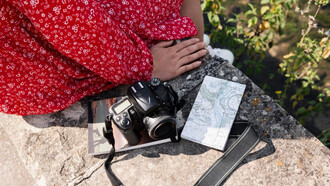Let’s set the scene: You’re staring at your laptop, Zoom-fatigued, while your potted plant judges you for re-wearing sweatpants again. The walls of your apartment—or cubicle, or hometown—feel like they’re closing in, pixel by pixel. Enter: The itch. Not the kind you get from questionable hostel sheets, but the soul-deep restlessness that whispers, “What if there’s more?”
For me, it hit during a particularly bleak Tuesday. I’d just canceled plans (again) to binge-watch a show I didn’t even like when it dawned on me: My life had become a Netflix algorithm—predictable, repetitive, and weirdly obsessed with true crime. So I did what any rational person would do: I Googled “cheapest one-way ticket to anywhere,” packed a carry-on, and became a walking cliché.
Nomad life: glitter vs. reality
Let’s be clear—nomadism isn’t all #VanLife sunsets and soul-searching in a hammock. My first month involved
A visa fiasco in Croatia (“But the website said 90 days!”).
A cockroach roommate in a Bangkok hostel (RIP, my unopened bag of chips).
A “remote job” that required Wi-Fi stronger than my will to live (spoiler: rural Portugal did not deliver).
Yet, amid the chaos, magic happened. I learned to haggle in Turkish markets using only eyebrow raises. I cried over Croatian truffle pasta (legit reason). I had an existential crisis in a Prague cemetery that somehow… fixed me? Travel doesn’t give you answers—it rewires your questions.
The world is your co-working space (sort of)
Here’s the plot twist: The world is bending over backward to accommodate wanderers. We’re living in the golden age of “Why yes, I am drafting emails from a Bali beach bar!” thanks to:
Digital nomad visas: countries like Estonia, Portugal, and Costa Rica now roll out red carpets (or at least decent Wi-Fi) for remote workers.
Co-living spaces: think summer camp for adults, minus the mosquito bites. Companies like Outsite and Selina offer beds, desks, and instant friends who’ll debate the best hummus brand with you at 2 a.m.
Remote work tools: Slack, Zoom, and Notion—the holy trinity of pretending you’re not actually in a hammock.
Even corporations are catching on. My former boss once side-eyed my “working from Medellín” request. Now? HR sends “Wellness Tips for Digital Nomads!” newsletters. Progress!
Identity shuffle: Who am I today?
Nomadism isn’t just about where you go—it’s about who you become along the way. In six months, I’d cycled through identities like
Barcelona me: Tapas enthusiast, amateur flamenco dancer, serial mispronouncer of “por favor.”
Vietnam me: motorbike daredevil (read: terrified passenger), pho addict, person who learned to haggle via Google Translate.
Reykjavik me: Northern Lights chaser, wool-sweater hoarder, survivor of a 3 p.m. sunset.
Travel forces you to shed old skins. That shy introvert? She’s now leading a pub crawl in Budapest. The control freak? He’s meditating in a Thai cave (or trying to). You’re not “finding yourself”—you’re building yourself, one chaotic bus ride at a time.
Temporary homes, permanent lessons
Living nomadically teaches you the art of impermanence. That $500 studio you agonized over decorating? Replaceable. That “dream job” you thought defined you? Just a chapter. Instead, you collect
Survival skills: navigating metro systems in Cyrillic, bribing border guards with candy (not recommended, but effective).
Perspective: realizing your “huge problems” are laughably small when you’re debating politics with a Slovenian farmer over homemade schnapps.
Minimalism: you’ll Marie Kondo your suitcase weekly. “Does this spark joy?” No? Ditch it for souvenir space.
Plus, you master the art of goodbyes. Friendships burn brighter when you know they’re temporary. That Dutch artist you bonded with over midnight gelato? You’ll cry at the airport, then text each other memes forever.
The dark side of the Wanderlust moon
Let’s not romanticize this. Nomad life can be lonely. There are days you’ll:
Miss your niece’s birthday because time zones are evil.
Burnout from the “always-on” hustle (time difference = 3 a.m. Zoom calls).
Get scammed by a tuk-tuk driver again (why do I trust smiling strangers?!).
And yes, sometimes you’ll question if you’re just… running away. But here’s the secret: everyone’s running from something. At least you’re sprinting toward sunrises over Angkor Wat instead of office fluorescents.
Why the future is flexible (and why that’s awesome)
The world’s shifting to embrace the nomadic wave:
Remote work revolution: companies like Airbnb and Spotify now let employees work from anywhere—even your mom’s basement (no judgment).
Nomad-finance hacks: banks like Revolut and Wise offer borderless accounts. Crypto bros might be annoying, but blockchain? Handy for getting paid in Timbuktu.
Eco-conscious travel: apps like FairTrip highlight sustainable stays, because nomads now care about carbon footprints and Instagram footprints.
Even education’s gone nomadic. Want to learn Spanish? Take classes in Guatemala. Coding? Join a Bali boot camp. The message is clear: The world’s your classroom, and attendance is optional.
So… should you do it?
If you’re craving a life upgrade that no productivity app can deliver, maybe yes. But ditch the fantasy of eternal bliss. Nomadism isn’t an escape—it’s a mirror. It’ll show you your resilience, your privilege, and your uncanny ability to sleep anywhere.
Start small: A month in Mexico. A workation in Lisbon. See how it feels to trade routines for sunrises in strange places. Worst case? You’ll return home with stories, a questionable tattoo, and the quiet knowledge that you can always leave again.















